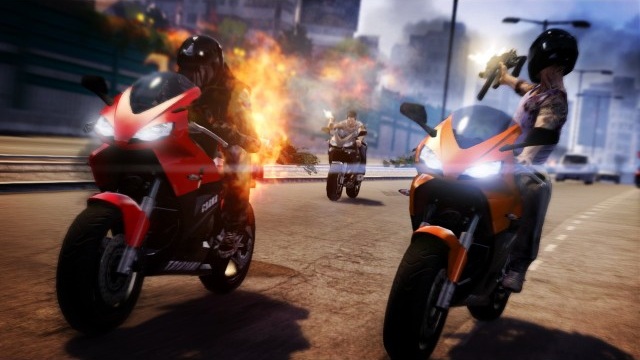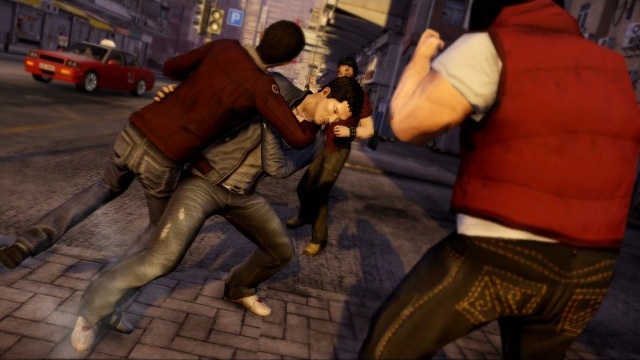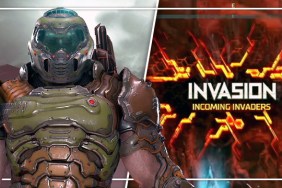Why don't you have a pork bun in your hand?!
I identify with Sleeping Dogs protagonist, Wei Shen. We're both Chinese-American, in our late twenties, appreciate the San Francisco Bay Area, have a sense of justice that teeters on the boundaries of the law, and tend to speak perfect American English even if people talk to us in Cantonese. All of this we have in common, like kindred spirits, despite the fact that I was born in the States and he was born in Hong Kong. At the same time, we both can't shake the uneasy feeling of estrangement in our "own country"—a fitting theme, as Sleeping Dogs is about an identity crisis.
Of course, for Wei Shen the issue is more pragmatic and immediate than nationalistic ties. As an undercover cop who has been assigned to infiltrate the fictional Sun On Yee Triad (based on the real Sun Yee On Triad), he leads an expected double life, one in which he must respect the law and break the law at the right time. The Triad gives him a license to kill, while the police lets him go if he ever gets caught. If this doesn't set the framework for vigilante justice, I don't know what does.
Wei's mission is to ascend the hierarchy of the Sun On Yee, while relaying intelligence and dismantling the organization from within. Naturally, he struggles to maintain his cover as his violent loyalty to his fellow Triad family members jeopardizes his standing in the police and impairs his state of mind, a point which his handler Raymond is keen to make at every chance encounter. As the finale draws near, the line between right and wrong shifts beneath his feet, and Wei must choose how best to balance the scales of justice.
Unfortunately, the story doesn't delve deeply enough into Wei's character, or anyone's character for that matter. Though the physical effect on his psyche is clear from the jitters he has upon awakening from the occasional nightmare, little seems to break through his facade, not even after killing hundreds of thugs (or running over hundreds of innocents with a sports car). Within the first half hour, he tells the tragic story of his sister who died from an overdose and a Hong Kong gang leader named Dogeyes who got her addicted. That's obviously an extraordinary personal impetus for Wei, but all this boils down to is several lines of dialogue. Likewise, the tension of what might happen if the Sun On Yee ever learns the truth about Wei, a tension that builds from the very start of the game, is never fully realized and makes the ending feel rushed and anticlimactic.
Sleeping Dogs is primarily voiced in English, sometimes with a Chinese accent, and spurts of authentic Cantonese spread throughout. I certainly wanted to have the entire game spoken in Cantonese with English subtitles—deliberately bumping into pedestrians to hear them curse at me is wonderfully nostalgic—but I understand that this was designed for a general American audience. The voice talent, featuring Will Yun Lee, Emma Stone, Tom Wilkinson, and Lucy Liu, can't be denied either.

The trouble, though, is that the dialogue shifts often between Cantonese and English, sometimes in mid-sentence and sometimes just repeating what was said in the other language, as if the developers couldn't decide on which one to use. No matter how practical it is, having Hong Kong natives speak grammatically correct English to each other is strange. Perhaps the only good news is that players will comprehend the story better in English as well as learn some Cantonese swear words (which I admit is the most important part of the language).
That said, the open world of Hong Kong itself is brilliantly crafted. It may not be realistic with how crowded Hong Kong really is, but this isn't where realism should be sticking its head in video games. On closer inspection some storefronts are repeated and there's the occasional pop-in. Still, the amount of signage that juts out above the street, the numerous water fountains, the curvy mountain roads, the slums along the harbor, and the vibrant foliage amidst the smoky skyscrapers bring Hong Kong to life. The art assets for some of the interiors are equally amazing, particularly the clubs and the hospital.
That's only one of many ways that Sleeping Dogs compares to Grand Theft Auto IV. Wei can steal any car, scooter, or motorcycle for quick travel access (what's up with NPCs not locking their doors?), listen to one of many radio stations, and cause a considerable amount of mayhem before the cops pay any attention. Once they give chase, though, the cops tend to be relentless so Wei will need fast thinking, a fast car, or a fast dip in the water to escape. If he needs a specific set of wheels, he can grab any vehicle he owns from one of the numerous parking lots, and he can get to any major location on his map instantly by hailing a taxi.

Not just a copycat of Niko Bellic, Wei is a badass cop who doesn't have a stamina meter and lets his fists do the talking. When he's not leaping about the city with the agility of a parkour master, he can grab, throw, drag, and use his surroundings with deadly force. Low-level brawlers and grapplers will attempt to overwhelm Wei with numbers, but he can take on a crowd without breaking a sweat as long as he stays focused on counters and notes the weaknesses of his opponents.
Similar to Batman: Arkham City or Assassin's Creed, Wei can parry any incoming attack with a well-timed button press and pull off specific moves that certain enemies can't block. Beyond upgrading his basic string of attacks, he can also learn deadlier bone-breaking martial arts by delivering jade statues to his sensei. Effective combat builds Wei's face meter, which when full, automatically puts Wei in a heightened state that regenerates health and gives his attacks extra impact. This rewards both strong offense and defense with equal weight.
The gunplay, though, is not as inspired as the beat-'em-up combat. Wei can take basic cover behind walls and tables, aim for headshots, and swap for guns that are laying about. Vaulting over cover will also initiate a short bullet-time sequence, but nothing particularly stands out, in part because of the emphasis on kung fu action. That said, there's little stopping Wei from taking a gun into a fist fight.

Outside of the 30 story missions, Wei can explore Hong Kong to his heart's content, upgrading his stats along the way while unlocking new moves and earning extra cash. Scattered about the four boroughs are collectibles like lockboxes, health shrines, and jade statues, as well as side quests like events, racing, cockfighting, and karaoke. Dating various women (Wei is ever the heartbreaker) will even reveal the locations of numerous collectibles. Food stalls, herbal tea, and message parlors will grant Wei temporary boosts that are well worth the cost. Players can also compare their prowess in missions and in various stats by checking out the Social Hub, where they can also replay any missions they've already finished.
While Sleeping Dogs comes close to matching the standard of Grand Theft Auto, it has a fair share of mishaps. In addition to the few game-freezing glitches I experienced, the game doesn't have a difficulty setting, making the experience less challenging. Restarting a mission from a checkpoint shouldn't reset Wei's temporary boosts and take away his firearm, and docking cop points for property damage during missions is frequently unavoidable when evading the cops. All of the mini-games—hacking, bugging, tracing, and unlocking—are a nuisance too, since there's usually no time limit, no reward for doing well, and hardly any penalty for messing up.
On a purely personal gripe, I despise the game's attempt to dumb down Hong Kong mahjong into its variation of mahjong poker, which is essentially Yahtzee and as far as I'm concerned should have been played with mahjong dice instead of tiles anyway. If Sleeping Dogs actually had authentic mahjong, an undeniable part of Hong Kong life, I would have given it a bonus half-star on principle alone.
Despite several setbacks with authenticity and character depth, Sleeping Dogs delivers an entertaining and realistic enough interpretation of Hong Kong to warrant a sequel. United Front Games should be commended for sticking it out after being forced into limbo when the game was dropped by Activision, and Square Enix should be commended for believing in them. And really, how can I let down my Cantonese brother? You know, represent. Dragons and everything. (Crap, I made myself crave dim sum…)
-
Appreciate the Cantonese (and the swearing)
-
...but the transitions into English are awkward
-
Decent cast of characters
-
...despite lack of character depth
-
Ending slightly rushed, story is good enough
-
Solid melee combat, adequate gunplay
-
Visually impressive open world of Hong Kong
-
Plenty of side tasks and missions
-
Social Hub, including mission replay
-
No difficulty setting
-
Few game-freezing glitches
-
Mahjong poker?! <i>Give me real mahjong!</i>







